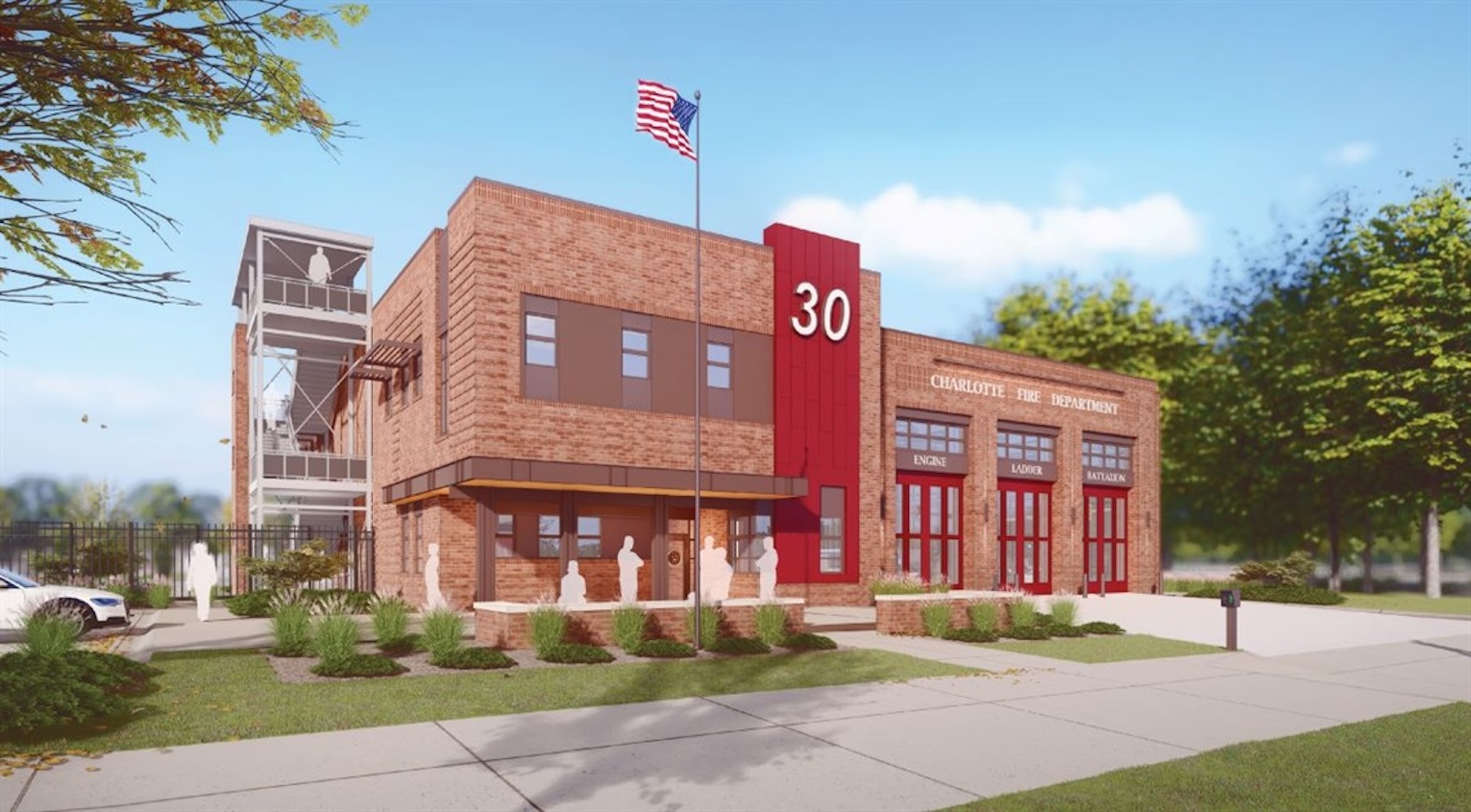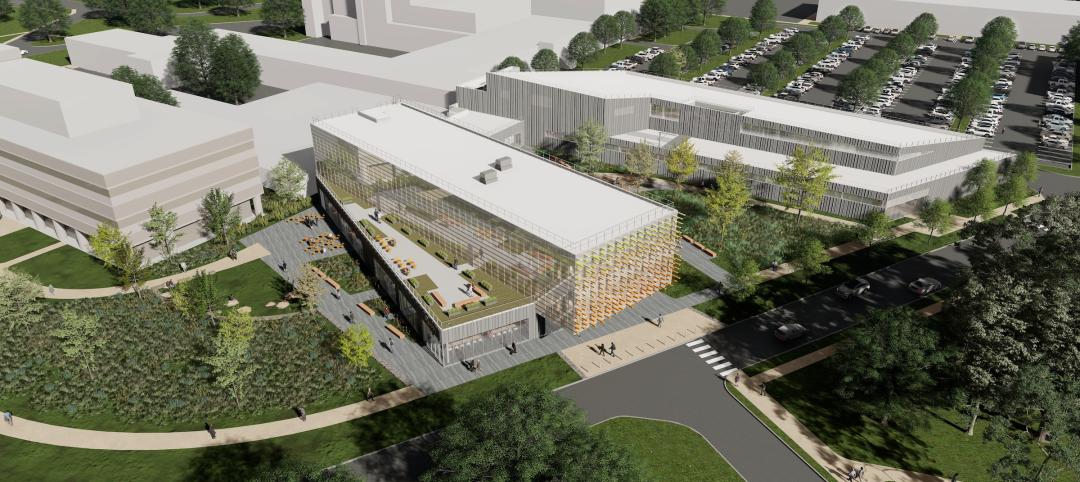Charlotte, N.C.’s new Fire Station #30 will be one of the country’s first all-electric fire stations, using no outside energy sources other than diesel fuel for one or two of the fire trucks. Multiple energy sources will power the station, including solar roof panels and geothermal wells. The two-story building features three truck bays, two fire poles, dispatch area, contamination room, and gear storage.
The $16.4 million, 14,000 sf station will be completed next fall. It will replace the original Station #30, a 1950’s-era residential home that was converted to a fire station in 1991. The new two-story building includes a fitness area with locker rooms, a kitchen and dining facility, a day room lounge, and offices for the captain and battalion chief. The second floor houses sleeping quarters and additional lockers and restrooms.
Geothermal wells will supply air conditioning as well as energy-efficient floor heating. Electric vehicle charging stations will charge the electric fire truck with additional wiring installed for future EV chargers. The site will also include two EV parking stations for employee cars.
RELATED STORY
Modular fire station allows for possible future reconfigurations
Core and shell construction includes the installation of new storefront systems of wall paneling and brick siding. A parking lot along with landscaping that includes tree planting is also part of the program. Throughout the project, general contractor Swinerton plans to use OpenSpace job site capturing, BIM 360 project collaboration, and drones to document construction.
Owner: City of Charlotte
Developer: Swinerton
Design architect/ Architect of record: ADW Architects
MEP engineering
Mechanical: Action Mechanical Contractors Inc.
Electrical: Stelco Electric LLC.
Plumbing: Peters Pipers Inc.
Structural engineer: Stewart Engineering
Here is the full press release from Swinerton:
Swinerton, an industry-leading commercial general contractor with offices nationwide, announces the construction of Charlotte Fire Department Station #30, one of the first all-electric fire stations in the United States. The $16.4 million build sets a new standard for public and civic spaces across North Carolina. Construction of the 14,000-square-foot project is underway and slated to be complete fall 2025.
“Sustainability tops the list of priorities at Swinerton,” explains Kevin Smith, Vice President, Division Manager, Swinerton’s Carolinas Division. “This new fire station, which will use no outside energy sources other than diesel fuel for one or two of the gas-powered fire trucks, is a testament to Charlotte’s commitment to its Strategic Energy Action Plan. We hope this is the first of many partnerships with the City of Charlotte to support its pursuit of this exceptionally important goal.” Initiated in June 2018, the city resolution strives to have its fleets and facilities be fueled by 100 percent zero-carbon sources by 2030.
Located at 3019 Beam Rd. on approximately three acres in southwest Charlotte, directly across from the city’s police and fire training academy, the all-electric fire station replaces the original Station #30, a 1950’s-era residential home that was converted to a fire station in 1991. Designed by ADW Architects, the new two-story building features three truck bays with accessibility from two fire poles, a dispatch area, decontamination room and gear storage. Additional amenities include a fitness area with locker rooms, a kitchen and dining facility, a day room lounge and offices for the captain and battalion chief. The second floor houses the sleeping quarters and additional lockers and restrooms.
Multiple energy sources will power Station #30. Solar roof panels are set to power the station while geothermic wells will supply air conditioning as well as energy-efficient floor heating. Electric vehicle charging stations will charge the electric fire truck with additional wiring installed for future EV chargers. The site will also include two EV parking stations for employee cars. The city plans to seek LEED® Silver certification as a showpiece for all future public buildings. “These sustainable measures promise a tangible reduction in operational carbon emissions compared to existing fire stations,” adds Smith.
As general contractor, Swinerton is providing ground-up construction services that include pre- and post-construction site work as well as core and shell construction that includes the installation of new storefront systems of wall paneling and brick siding. A parking lot along with landscaping that includes tree plantings, concludes the construction project. Throughout the project, Swinerton plans to use some of the many technologies in its arsenal, including OpenSpace job site capturing, BIM 360 project collaboration and drones to document construction.
Since expanding to the Southeast in 2018, the Carolinas Division has constructed nearly $400 million of commercial environments. The dedicated team of 90 construction leaders specializes in corporate interiors and buildings, healthcare, education, restaurants and hospitality, multifamily and mass timber construction.
Related Stories
Sustainable Design and Construction | Oct 10, 2024
Northglenn, a Denver suburb, opens a net zero, all-electric city hall with a mass timber structure
Northglenn, Colo., a Denver suburb, has opened the new Northglenn City Hall—a net zero, fully electric building with a mass timber structure. The 32,600-sf, $33.7 million building houses 60 city staffers. Designed by Anderson Mason Dale Architects, Northglenn City Hall is set to become the first municipal building in Colorado, and one of the first in the country, to achieve the Core certification: a green building rating system overseen by the International Living Future Institute.
Government Buildings | Sep 17, 2024
OSHA’s proposed heat standard published in Federal Register
The Occupational Safety and Health Administration (OSHA) has published a proposed standard addressing heat illness in outdoor and indoor settings in the Federal Register. The proposed rule would require employers to evaluate workplaces and implement controls to mitigate exposure to heat through engineering and administrative controls, training, effective communication, and other measures.
Government Buildings | Aug 19, 2024
GSA posts new RFI for enabling energy efficiency, decarbonization in commercial buildings
The U.S. General Services Administration (GSA), in collaboration with the U.S. Department of Energy, recently released a new Request For Information (RFI) focused on enabling energy efficiency and decarbonization in commercial buildings. GSA wants to test innovative technologies through GSA’s Center for Emerging Building Technologies.
Curtain Wall | Aug 15, 2024
7 steps to investigating curtain wall leaks
It is common for significant curtain wall leakage to involve multiple variables. Therefore, a comprehensive multi-faceted investigation is required to determine the origin of leakage, according to building enclosure consultants Richard Aeck and John A. Rudisill with Rimkus.
Government Buildings | Aug 14, 2024
GSA releases updated standards to move federal buildings toward zero emissions
The U.S. General Services Administration (GSA) recently released updated building efficiency standards for federal buildings. The mandatory design and construction standards and performance criteria apply to 300,000 federal buildings.
Sustainability | Aug 14, 2024
World’s first TRUE Zero Waste for Construction-certified public project delivered in Calif.
The Contra Costa County Administration Building in Martinez, Calif., is the world’s first public project to achieve the zero-waste-focused TRUE Gold certification for construction. The TRUE Certification for Construction program, administered by Green Business Certification Inc. (GBCI), recognizes projects that achieve exceptional levels of waste reduction, reuse, and recycling.
Smart Buildings | Jul 25, 2024
A Swiss startup devises an intelligent photovoltaic façade that tracks and moves with the sun
Zurich Soft Robotics says Solskin can reduce building energy consumption by up to 80% while producing up to 40% more electricity than comparable façade systems.
Government Buildings | Jul 8, 2024
GSA adopts new accessibility guidelines for federal properties
The U.S. General Services Administration (GSA) adopted a new rule with new accessibility guidelines for federal buildings. The rule establishes that pedestrian facilities in the public right-of-way are readily accessible to and usable by people with disabilities.
Smart Buildings | Jul 1, 2024
GSA to invest $80 million on smart building technologies at federal properties
The U.S. General Services Administration (GSA) will invest $80 million from the Inflation Reduction Act (IRA) into smart building technologies within 560 federal buildings. GSA intends to enhance operations through granular controls, expand available reporting with more advanced metering sources, and optimize the operator experience.
Laboratories | May 24, 2024
The Department of Energy breaks ground on the Princeton Plasma Innovation Center
In Princeton, N.J., the U.S. Department of Energy’s Princeton Plasma Physics Laboratory (PPPL) has broken ground on the Princeton Plasma Innovation Center (PPIC), a state-of-the-art office and laboratory building. Designed and constructed by SmithGroup, the $109.7 million facility will provide space for research supporting PPPL’s expanded mission into microelectronics, quantum sensors and devices, and sustainability sciences.

















